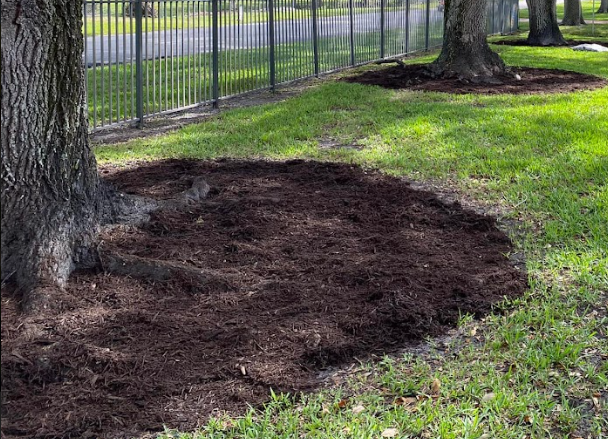Mulching is a critical part of tree care and ensuring healthy growth. Besides preventing weed growth, mulch helps retain soil moisture to keep your fruit trees hydrated. Some mulches can attract beneficial organisms to the soil and help enhance tree health, while others can boost your fruit tree’s immune system.
However, not all mulches are the same, so you should find the best mulch for fruit trees to ensure the best results. Here we explore some of the best types of mulch for fruit trees as recommended by the leading provider of mulching services in Bryans Road, MD.
Compost
Compost is an excellent mulch for fruit trees as it contains some amount of all three major nutrients that trees need:
- Nitrogen
- Phosphorus
- Potassium
Mulching your fruit trees with one to two inches of compost during the spring will help insulate the trees and inhibit weed growth. It will also add nutrients and organic matter to the soil over time.
Leaf Mold
Like compost, leaf mold contains some nitrogen, potassium, and phosphorous. However, compost is a product of soil bacteria, whereas leaf mold comes from beneficial fungi in the soil.
Leaf mold feeds beneficial microorganisms in the soil while enhancing soil texture and the ability to retain water. It is an excellent option for your fruit trees as it’s easy to make.
All you need to do is collect fallen leaves from your yard and neighborhood, avoiding diseased leaves that can contaminate the soil. Next, put the leaves in a pile before spraying them lightly with water.
Afterward, cover the pile with a tarp and wait for the beneficial fungi to act. The fungi should break down the leaves in one to two years, resulting in a dark brown, crumbly mulch with a pleasant, earthy smell.
Hardwood Mulch
As the name implies, this mulch comes from hardwoods such as oak trees. It’s the best mulch for fruit trees that prefer alkaline or neutral soils as it naturally raises pH levels. Some fruit trees that thrive under hardwood mulch include apples, mulberries, peaches, plums, and pears.
Ramial Mulch
While the best way to make ramial mulches is from your fruit tree cuttings, you can also make them from the young branches you’ve pruned off other healthy deciduous trees. The tender young tree branches are abundant in nutrients that help fruit trees thrive, such as nitrogen, potassium, phosphorous, magnesium, and calcium.
If you cut or shred these young branches, they’ll eventually decompose and release nutrients into the soil, where fruits will absorb them.
Straw Mulch
Straw is often the mulch of choice for growing strawberries. This mulch will prevent your fruits from touching the soil, promote moisture retention, and protect the plant roots from extreme cold or hot temperatures.
Over time, the straw decomposes and releases nutrients for your fruit trees. If you opt for straw mulch, ensure you harvest the plant before it produces seeds. Otherwise, your mulch will end up producing more weeds than it prevents.
Another notable downside of straw mulch is that it attracts rodents that use straw as their habitat. These animals may chew on the bark of fruit trees.
Contact Your Local Tree Experts for Assistance
Now that you understand the different types of mulches, you should contact an experienced professional to help you choose the best mulch for fruit trees. At Hernandez Complete Tree Service, we offer a wide range of professional tree services, including:
- Tree removal
- Stump grinding and removal
- Emergency tree services
Contact us at 240-299-4639 for more information about mulching or any other tree service you may need.


